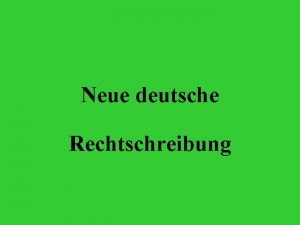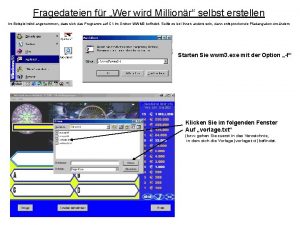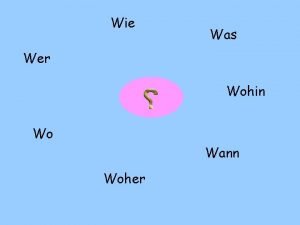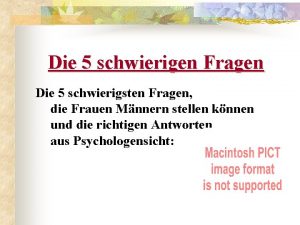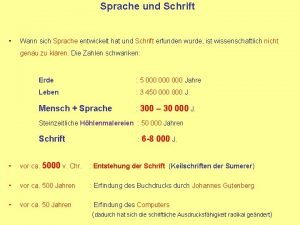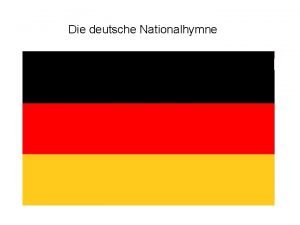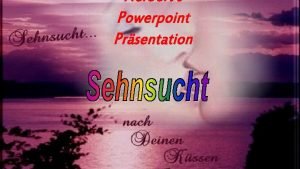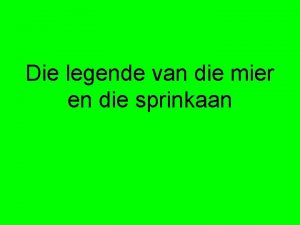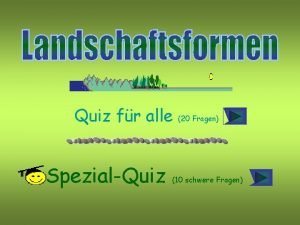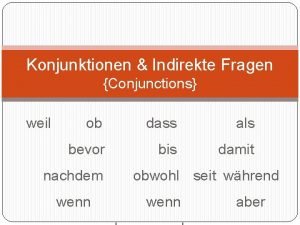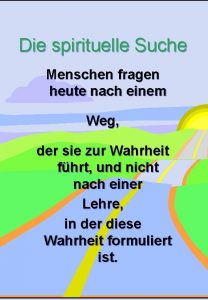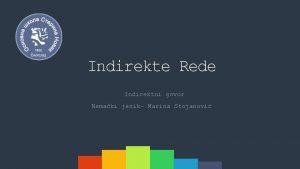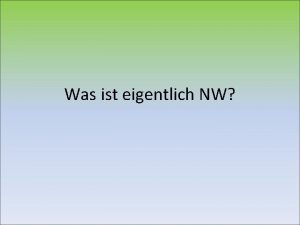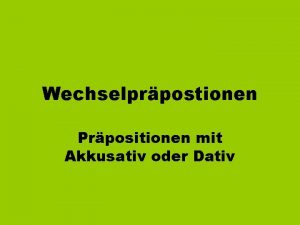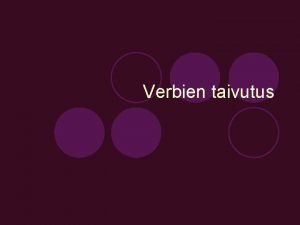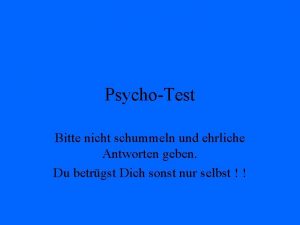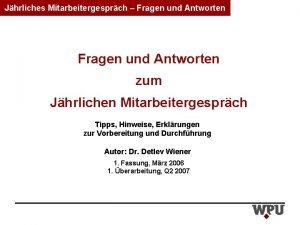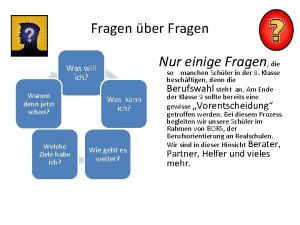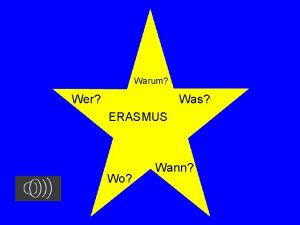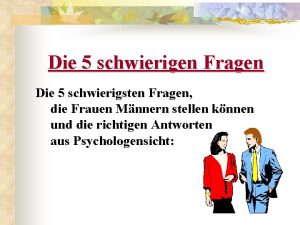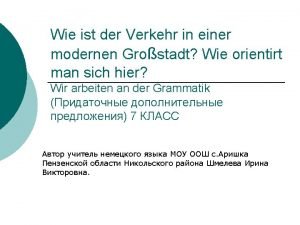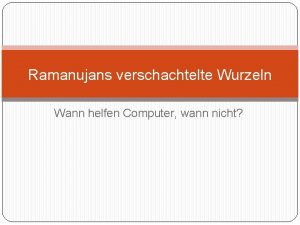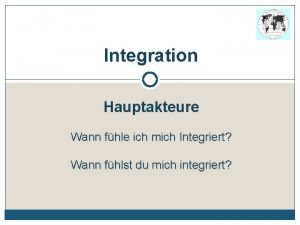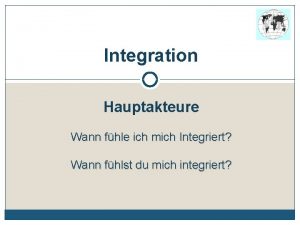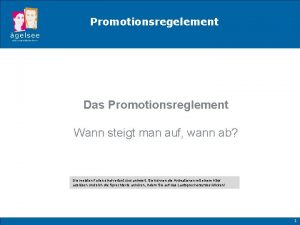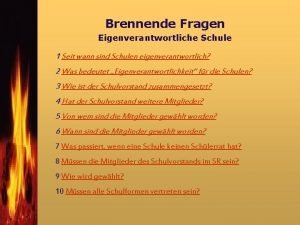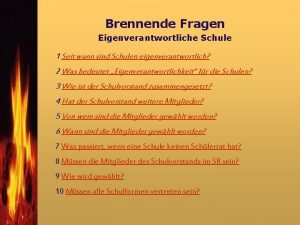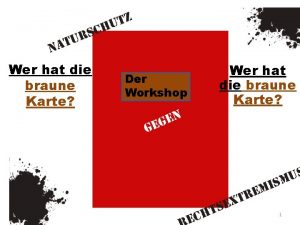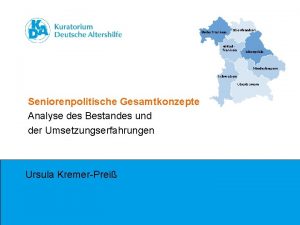Die Fragen Wrter Wer Was Wann 1 Die




















- Slides: 20

Die Fragen Wörter Wer? Was? Wann? 1

Die Fragen Wörter We are already familiar with several words used for asking information questions: Wie geht es dir? How are you? Woher kommst du? Where are you from? Wer ist sie? Who is she? 2

Alle Fragewörter… è è è è è Was? Wer? Welche (s)(r)? Wie? Wann? Um wieviel Uhr? Wieviel? / Wieviele? Wo? / Wohin? /Woher? Warum? 3

Aber, was bedeuten sie? Was? Wer? Welche (s)(r)? Wie? Wann? Um wieviel Uhr? Wieviel? / Wieviele? Wo? / Wohin? /Woher? Warum? What? Who? Which (one / ones)? How? When? At what time? How much / many? Where? / Where to? /Where from? Why? 4

Zum Beispiel… Welche ist deine Schultasche? * Which (one) is your backpack? Welche sind deine Papiere? * Which (ones) are your papers? * Welche (s)(r) is used to choose from among a group 5

Zum Beispiel… Wer ist deine Deutschlehrerin? * Who is your German teacher? Wer sind sie? * Who are they? * Wer gets singular / plural answers – Watch the verb! 6

Zum Beispiel… Wieviel Hausaufgaben haben wir in Deutsch? How much homework do we haben in German? Wieviele Schüler gibt es in der Klasse? How many students are in the class? 7

Zum Beispiel… Warum lernst du heute? Why are you studying today? Ich lerne, denn ich haben einen Test. I am studying because I have a test. 8

Zum Beispiel… Wann ist das Rockkonzert? When is the rock concert? Was ist das? What is this? Wo sind mein Bücher? Where are my books? 9

Was? Wer? Welche (s)(r)? Wohin? /Woher? These are NOT Yes/No questions! Wie? Wann? Wieviele? Warum? 10

Ich habe eine Frage… There are several ways to ask a question in German, besides using question-asking words. One way is to simply place the subject after the verb, and change the inflection of your voice: Michael ist hier. s v Ist Michael hier? v s This is a Yes/No question! 11

Ich habe noch eine Frage… Sometimes the written question marks and the rising tone of the speaker’s voice alone may indicate the difference between a statement and a question: Wir haben ein Quiz morgen!? 12

…und ich habe noch eine Frage… Sometimes you can add a tag word such as oder? or richtig? to the end of a sentence, much as you might add right? , don’t you? , etc. , in English: Wir haben ein Quiz morgen, richtig? We have a quiz tomorrow, right? Peter ist krank, oder? Peter is sick, isn’t he? 13

…und noch eine Frage… When forming information questions with any of the interrogative words (wie? , welche(s)(r)? , etc. ), the verb precedes the subject, just as in English: Wann ist das Rockkonzert? v s Das Rockkonzert ist am Samstag. s v 14

…und noch eine Frage… The interrogative words may be used alone or in combination with various prepositions: Um wieviel Uhr ist das Konzert? Es ist um 20 Uhr. Wohin gehst du nach der Schule? Ich gehe nach Hause. Woher kommst du? Ich komme aus California. 15

Fragen und Antworten… When answering questions, pay attention to the verb form. The verb form in the answer will be based on the question. If the question is asked of you, the answer is in the I form. If the question asks about him, then the answer is also about him, etc. EVERY sentence (answer) must have a subject and a verb. 16

Question Answer ich du/ Sie du er/ sie ich er/ sie Sie (formal) ich wir ihr sie (plural) wir/ ihr wir sie (plural) Sie (formal) ich 17

Und die Antwort ist… Lernst du viel in der Schule? Kaufst du das Mittagessen heute? Gibt es viel Hausaufgaben in Englischklasse? Sprichst du viel in der Klasse? Brauchen wir das Buch für Deutschklasse heute? Kommst du zu Fuß zur Schule? Tanzt ihr viel? Suchen Sie das Heft? Bringt ihr einen Bleistift zur Schule? Bist du jetzt in Geschichteklasse? 18

Und die Antwort ist… Was lernst du in der Schule? Was kaufst du zum Mittagessen heute? Wieviel Hausaufgaben haben wir in Englischklasse? Wie oft sprichst du in der Klasse? Was brauchen wir das Buch in der. Deutschklasse? Warum kommst du zu Fuß zur Schule? Wie tanzt ihr? Wo haben Sie das Heft? Wieviele Bleistifte habt ihr? Wo bist du jetzt? 19

Wir sind fertig… DAS ENDE. 20
 Duden.de
Duden.de Wer wird millionär fragen selbst erstellen
Wer wird millionär fragen selbst erstellen Was wo wer wann warum wie woher
Was wo wer wann warum wie woher Die schwierigsten fragen
Die schwierigsten fragen Sumerische keilschrift lernen
Sumerische keilschrift lernen Einich keit und recht und freiheit text
Einich keit und recht und freiheit text Nur wer die sehnsucht kennt
Nur wer die sehnsucht kennt Oskar schindler ring inschrift
Oskar schindler ring inschrift Die mier en die sprinkaan fabel
Die mier en die sprinkaan fabel Fragen zur dna
Fragen zur dna Quizfr
Quizfr Indirekte fragen
Indirekte fragen Wahrheit fragen
Wahrheit fragen Indirektne recenice nemacki
Indirektne recenice nemacki Danken rektion
Danken rektion Naturwissenschaftliche fragen
Naturwissenschaftliche fragen Antworten präposition
Antworten präposition Du darfst mir 3 fragen stellen
Du darfst mir 3 fragen stellen Verbien taivutus
Verbien taivutus Psychotest fragen antworten
Psychotest fragen antworten Antworten mitarbeitergespräch
Antworten mitarbeitergespräch
